|
|
|
Sort Order |
|
|
|
Items / Page
|
|
|
|
|
|
|
| Srl | Item |
| 1 |
ID:
105595
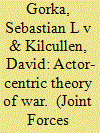

|
|
|
| 2 |
ID:
122037
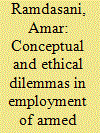

|
|
|
| 3 |
ID:
093793
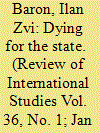

|
|
|
|
|
| Publication |
2010.
|
| Summary/Abstract |
This article introduces the problem of having to risk one's life for the state in war, asking first why this question is no longer asked in the just war literature and then suggesting five issues that relate to this question: 1) that of individual consent, 2) whether or not any state can be justified in obliging its citizens in this regard and whether or not the type of government is important, 3) whether or not the problem of the obligation differs between conscript and volunteer armies, 4) the problem of political obligation and how any individual could be justifiably obliged to risk his or her life for the state in war, and 5) the question of whether a citizen may be obliged to go into any war. The argument is that these questions are no longer given much attention in the just war literature because of the way that the concept of proper authority has come to be understood. The article concludes by suggesting that the problem of the 'obligation to die' should be included in our understanding and use of just war theory and the ethics of war.
|
|
|
|
|
|
|
|
|
|
|
|
|
|
|
|
| 4 |
ID:
054055
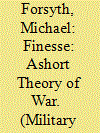

|
|
|
|
|
| Publication |
Jul-Aug 2004.
|
|
|
|
|
|
|
|
|
|
|
|
|
|
|
|
| 5 |
ID:
090351


|
|
|
|
|
| Publication |
2009.
|
| Summary/Abstract |
Walzer has recently updated his just war theory to take account of terrorism, humanitarian military intervention and new interpretations of the doctrine of self-defence, pre-emptive and preventative warfare The ethical considerations that underwrite Walzer's most recent work invite us beyond the routine citation of his work to a proper consideration of the moral parameters of international politics. Beyond Just and Unjust Wars Walzer has a wealth of insight into the key questions of international theory. His work on toleration, the nature of universality or on the role of social criticism has always been the basis of his insight in to the hard questions of international ethics. Despite being heavily criticised for being communitarian or conservative (both charges that need serious re-evaluation) Walzer's ideas offer a real alternative to the dominant neo-Kantian cosmopolitan tradition and a workable ethical framework for thinking about the challenges of contemporary international politics and international law. Nowhere is this more apparent than in the final essay of Arguing About War. The essay, entitled 'Governing the Globe' offers a radical vision of a reformed international society inspired by the principles that underpin Walzer's development of his just war theory and it is vital that we take notice.
|
|
|
|
|
|
|
|
|
|
|
|
|
|
|
|
| 6 |
ID:
030505
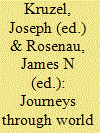

|
|
|
|
|
| Publication |
Laxington, Lexington Books, 1989.
|
| Description |
x, 534p.Hbk
|
| Series |
Issues in World Politics Series
|
| Standard Number |
0669178357
|
|
|
|
|
|
|
|
|
|
|
|
Copies: C:1/I:0,R:0,Q:0
Circulation
| Accession# | Call# | Current Location | Status | Policy | Location |
| 031222 | 923.7/KRU 031222 | Main | On Shelf | General | |
|
|
|
|
| 7 |
ID:
075006
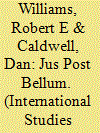

|
|
|
|
|
| Publication |
2006.
|
| Summary/Abstract |
What happens following a war is important to the moral judgments we make concerning warfare, just as the intentions going in and the means used are. There has, however, been inadequate attention paid to considerations of jus post bellum in the just war tradition. This essay seeks to contribute to recent efforts to develop jus post bellum principles by first noting some of the ways that jus ad bellum and jus in bello considerations serve to constrain what can legitimately be done after war. We argue, however, that the constraints grounded in traditional just war theory do not offer sufficient guidance for judging postwar behavior and that principles grounded in the concept of human rights are needed to complete our understanding of what constitutes a just war. A just peace exists when the human rights of those involved in the war, on both sides, are more secure than they were before the war.
|
|
|
|
|
|
|
|
|
|
|
|
|
|
|
|
| 8 |
ID:
122089
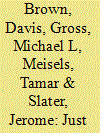

|
|
|
| 9 |
ID:
132320
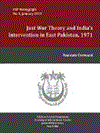

|
|
|
|
|
| Publication |
New Delhi, KW Publishers Pvt Ltd, 2014.
|
| Description |
vi, 83p.Pbk
|
| Series |
PSP Monograph No.1, January 2013
|
| Standard Number |
9789383649181
|
|
|
|
|
|
|
|
|
|
|
|
Copies: C:1/I:0,R:0,Q:0
Circulation
| Accession# | Call# | Current Location | Status | Policy | Location |
| 057800 | 327.5405491/GOS 057800 | Main | On Shelf | General | |
|
|
|
|
| 10 |
ID:
022819
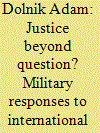

|
|
|
|
|
| Publication |
Summer 2002.
|
| Description |
21-39
|
|
|
|
|
|
|
|
|
|
|
|
|
|
|
|
| 11 |
ID:
079207
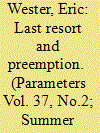

|
|
|
| 12 |
ID:
101585
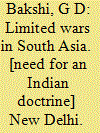

|
|
|
|
|
| Publication |
New Delhi, KW Publishers, 2010.
|
| Description |
xi, 191p.
|
| Standard Number |
9789380502458, hbk
|
|
|
|
|
|
|
|
|
|
|
|
Copies: C:2/I:0,R:0,Q:0
Circulation
| Accession# | Call# | Current Location | Status | Policy | Location |
| 055648 | 355.020954/BAK 055648 | Main | On Shelf | General | |
| 055929 | 355.020954/BAK 055929 | Main | On Shelf | General | |
|
|
|
|
| 13 |
ID:
084638
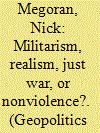

|
|
|
|
|
| Publication |
2008.
|
| Summary/Abstract |
Despite illuminating multiple modalities by which armed conflict is discursively justified, critical geopolitics can be criticised for providing a weak normative engagement with the social institution and practices of warfare. This has limited the impact of this school of thought outside of geography and critical security studies at a time when the ethics of military intervention have been prominent in public debate. This article explores the moral discourse of critical geopolitics through an examination of Gerard Toal's writings on Iraq and Bosnia. This scholarship is reviewed in the light of Coates's typology of major traditions of moral reflection on war - militarism, realism, just war theory, and pacifism/nonviolence. This analysis interrogates Toal's narratives, in which American military intervention was advocated in the Former Yugoslavia and opposed in Iraq. This suggests that rather than a thoroughgoing commitment to pacifism/nonviolence, or a blanket cynicism about American foreign policy, Toal's thinking includes an underlying attachment to some form of just war reasoning. However, its implicit and partial appropriation leads to a certain incoherence and selectivity that calls for further reflection. This presents a challenge to critical geopolitics. If it chooses to engage more explicitly with just war theory, its insights into identity and militarism could in turn inform a reworking of aspects of the theory, thereby facilitating critical geopolitics' engagement with wider public anti-militaristic modes of discourse. However, as this risks blunting the political potential of the project and repeating the mistakes of twentieth-century geopolitical thought, the paper concludes with a call for a wholehearted commitment to nonviolence.
|
|
|
|
|
|
|
|
|
|
|
|
|
|
|
|
| 14 |
ID:
161428
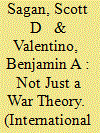

|
|
|
|
|
| Summary/Abstract |
In this article we assess American public attitudes toward the just war principles of proportionality, due care and distinction. Consistent with the logic of proportionality, we find that Americans are less willing to inflict collateral deaths on foreign civilians when the military advantage of destroying a target is lower. Most Americans also are willing to risk the deaths of American soldiers to avert a larger number of collateral foreign civilian deaths, which accords with the due care principle. Nevertheless, we find that the public's commitments to proportionality and due care are heavily biased in favor of protecting American soldiers and promoting US national security interests. Moreover, we find little evidence that the majority of the public supports the principle of noncombatant immunity, and, contrary to just war doctrine, Americans are more likely to accept collateral deaths of foreign civilians when those civilians are described as politically sympathetic with the adversary.
|
|
|
|
|
|
|
|
|
|
|
|
|
|
|
|
| 15 |
ID:
096787
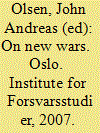

|
|
|
|
|
| Publication |
Oslo, Institute for Forsvarsstudier, 2007.
|
| Description |
22p.
|
| Series |
Oslo files on defence and security - 4/2007
|
| Standard Number |
15046753
|
|
|
|
|
|
|
|
|
|
|
|
Copies: C:1/I:0,R:0,Q:0
Circulation
| Accession# | Call# | Current Location | Status | Policy | Location |
| 055010 | 355.02/OLS 055010 | Main | On Shelf | General | |
|
|
|
|
| 16 |
ID:
054165
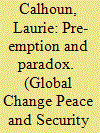

|
|
|
| 17 |
ID:
113375
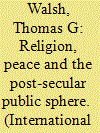

|
|
|
| 18 |
ID:
105976
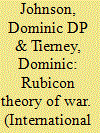

|
|
|
|
|
| Publication |
2011.
|
| Summary/Abstract |
A major paradox in international relations is the widespread fear and anxiety that underlies the security dilemma in times of peace and the prevalence of overconfidence or "false optimism" on the eve of war. A new theory of the causes of war-the Rubicon theory of war-can account for this paradox and explain important historical puzzles. The "Rubicon model of action phases," which was developed in experimental psychology, describes a significant shift in people's susceptibility to psychological biases before and after making a decision. Prior to making decisions, people tend to maintain a "deliberative" mind-set, weighing the costs, benefits, and risks of different options in a relatively impartial manner. By contrast, after making a decision, people tend to switch into an "implemental" mind-set that triggers a set of powerful psychological biases, including closed-mindedness, biased information processing, cognitive dissonance, self-serving evaluations, the illusion of control, and optimism. Together, these biases lead to significant overconfidence. The Rubicon theory of war applies this model to the realm of international conflict, where implemental mind-sets can narrow the range of bargaining options, promote overambitious war plans, and elevate the probability of war.
|
|
|
|
|
|
|
|
|
|
|
|
|
|
|
|
| 19 |
ID:
100073
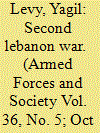

|
|
|
|
|
| Publication |
2010.
|
| Summary/Abstract |
Israel's Second Lebanon War (2006) is a typical manifestation of a flawed war fought by a democratic society. As such, it represents an important opportunity to provide significant evidence regarding the validity of theories that deal with the "democratization of war" syndrome, that is, the limitations imposed on the way democracies wage war and how they cope with these limitations. This article argues that the events of the war exhibit four theoretical propositions, all of which are drawn from the U.S. post-Vietnam experience: speedy decision making to avert public disputes, a weak "civilian" government that struggles to restrain the military, the proclivity to shorten the war and reduce its costs, and the setting of overly ambitious war goals as a means of mobilizing public support. In short, the imperatives derived from the democratization of war syndrome produce mechanisms that work to heighten belligerence rather than temper it.
|
|
|
|
|
|
|
|
|
|
|
|
|
|
|
|
| 20 |
ID:
120469
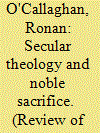

|
|
|
|
|
| Publication |
2013.
|
| Summary/Abstract |
The last decade has witnessed an attempt to solidify debate on war around the dichotomy of just war and holy war. In this dichotomy, the just war has increasingly been depicted as the progressive secularised opposite to holy war's antiquated religious fundamentalism. While wars argued for under the just war banner have been extensively critiqued and protested against, the rights based language of just war theory has largely escaped critical evaluation. Michael Walzer has emerged as a pivotal figure in just war theory's modern, secular rebirth within the discipline of International Relations. Walzer's theory argues the language of just war theory provides an effective means for us to engage with the moral reality of war. Drawing upon the work of Jacques Derrida this article investigates the construction of Walzer's moral language and its ethical implications. The first section focuses on Walzer's moral language; its structure, inconsistencies, and theological underpinnings. The second section addresses how Walzer employs this language to justify the sacrifice of combatants in defence of non-combatants. The central arguments presented in this article are that Walzer's theory is inconsistent in itself, and that the sacrifices initiated by this language constitute the unjustified sacrifice of just war theory's own ethical principles.
|
|
|
|
|
|
|
|
|
|
|
|
|
|
|
|
|
|
|
|
|